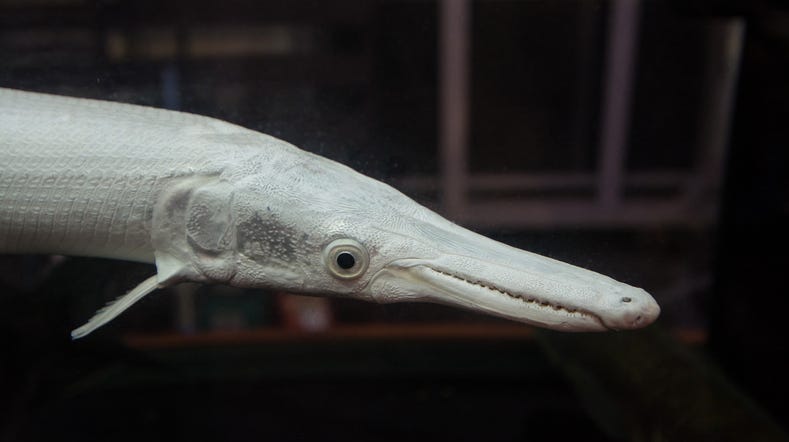
There truly is no place like home. A fish whose ancestors date back nearly 100 million years was caught in Kansas by a man who couldn't believe the prehistoric predator was on his line.
Danny "Butch" Smith II landed a 4-foot, 6-inch alligator gar, weighing 39.5 pounds. When Smith reeled the beast in, he knew that what he had caught was unusual. So when his fishing partner identified the fish, he said, "They ain't supposed to be here," Smith said to USA Today.
The Kansas Department of Wildlife and Parks confirmed the catch, calling the fish a "living fossil." As of now, they are investigating how the creature got into the Neosho River in southeast Kansas.
The snout of the creature resembles American alligators with razor-sharp teeth, according to NationalGeographic.com. The aquatic creature can also grow up to 10 feet long and weigh up to 350 pounds.
The fish's predecessors may have lived in Iowa or Kansas in prehistoric times. Now, the modern alligator gars are found in the lower Mississippi River Valley, from Arkansas and Oklahoma to Florida, Texas, and parts of Mexico, NatGeo said.
The fish doesn't pose a threat to humans as they only eat other fish, crabs, turtles, birds, and small mammals, so keep your pomeranian safe in Kansas.
Smith knew when the fish hit his line that he had hooked something huge.
"I thought I had a pretty decent flathead," Smith told USA Today. "But it fought and fought, pretty soon it come plum out of the water. The shape of its head really threw me off."
When the fish came back to the edge of Smith's boat, he pulled it in, and it "tore the boat up. I was shocked by it," Smith said.
"The fish was flopping and flipping and destroyed one of my oars," Smith said. "There was one little flathead about 10 or 15 pounds in the boat, and it was wanting out of the boat just as bad as I was because (the bigger fish) was tearing up things bad."
Smith also got a close-up look at the fish's mouth, saying it had "sharp teeth and double rows of teeth in his mouth."
State officials assume the fish was released from an aquarium as it was the first of its species to be caught in the state.
"It's not unlikely this fish was once somebody's pet or purchased from a pet store and simply released into the river once it became too large," the department's fisheries division director Doug Nygren said in a news release.



